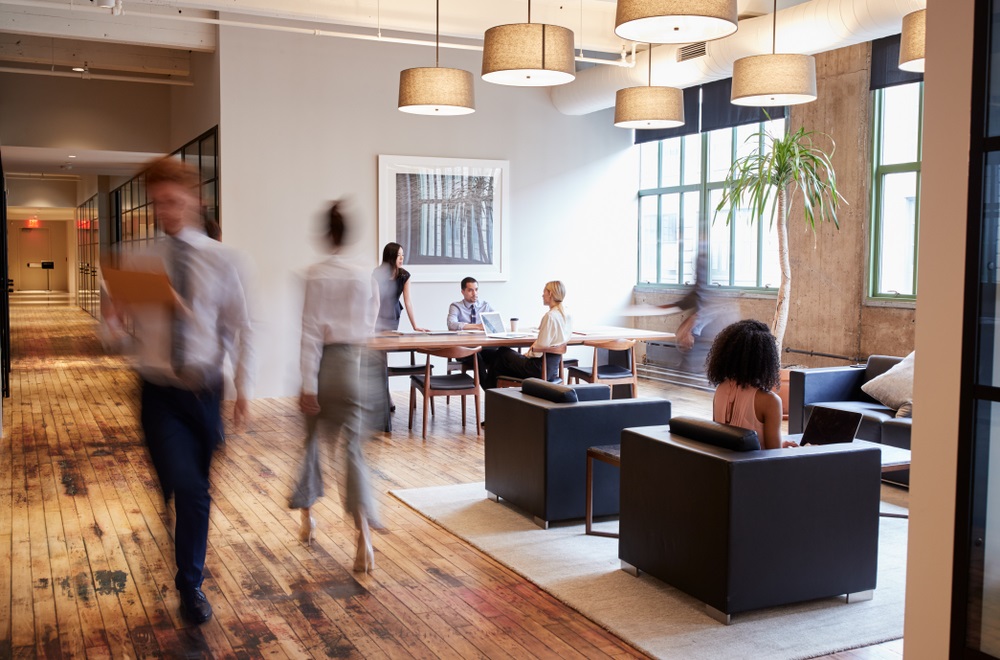Market Disruption is a Positive Driving Force for Flexible Coworking

Type the phrase ‘coworking’ into any search engine and your top results are guaranteed to be about WeWork, its rescue deal and the fate of ex-CEO and co-founder, Adam Neumann. So, you could be forgiven for taking the struggles of WeWork as an indication of the state of the flexible office industry, but you would be wrong.
Not only globally, but also here in the UK, the flexible coworking market is experiencing unprecedented growth. Longstanding players such as IWG and newer entrants to the market such as Knotel are expanding at exponential rates and variety in the marketplace is rife. Like retail, office providers and operators are differentiating, moving away from the traditional offering with plain décor and basic facilities, to deliver hands-on management and engaging experiential environments.
Well-known brands like Google and Facebook have built a reputation for their colourful offices with swings, slides and beanbags, and many coworking spaces are offering similar benefits such as table tennis tables, football tables and bars. However, although these services are enjoyed (and still important), there is an increasing demand for strong customer service.
Taking lessons from the retail and hospitality sectors, providers are introducing new levels of customer service and intelligence, disrupting the property sector as we know it! Service has become the forefront of office business models and is transforming how offices are developed, managed and presented to occupiers.
Experiential
Experiential management has become a key focus and understanding the target market is essential: What are they looking for? What do they expect? What environment can support the productivity and retention of staff? What amenities, tenants and additional services can the building provide?
Wellness
Employee wellness and mental health have quickly become significant factors employers support and manage in the workplace. Does the office encourage fitness, is there space to hold yoga classes or shower facilities if tenants cycle to work? Could empty space be used to offer free fitness classes? If the tenant encourages collaborative and cross-department working, is there flexibility to change the office layout?
Technology
Technology has a big bearing on the sector, from access, space management and reservations, to invoicing and marketing. Technology needs to be utilised to efficiently manage space, make the service convenient, allow tenants to work more efficiently and have a sustainable future.
Data
Technology has developed massively and with it comes a plethora of data and analytics. For landlords and operators, this allows a deeper understanding of how companies use their space and can evolve their product accordingly.
What does all this mean for the market?
All these factors help differentiate the product, enables the customer to operate more productively and boosts retention rates. Some exciting examples in the market currently include:
- The Crown Estate’s One Heddon Street has been innovatively refurbished, focused around well-being and productivity. Features include access to natural light, comfortable desks, clean air and water and fitness space. One Heddon Street will be the world’s first coworking space to achieve WELL certification from the International Well Building Institute.
- Third Door is an office provider for working parents and passionate childcare professionals who believe that work and family can grow together. They offer coworking solutions with nurseries onsite.
- Ministry of Sound created a coworking space influenced by a nightclub environment, targeted towards creative industries. In addition to a modern interior, they have included a recording studio, 22-meter-long bar, cinema, bicycle racks, gym and wellness classes, amongst much more!
- TOG has opened an extremely sustainable office space opposite Borough underground, surrounded by some of London’s most popular bars and restaurants. The interior has a real modern feel with numerous sustainable features including a green roof garden, solar panels, rainwater harvesting, low energy lighting and lots of bike storage!
All this disruption and differentiation is really benefiting the sector. There is greater competition, resulting in more choice and better community environments. Professionals and talented creatives can come together with like-minded individuals, work in the most productive and engaging environment suited to them and enjoy enhanced customer service and atmospheric offerings. Working side by side with like-minded individuals and businesses within a space that really feels enlivening drives creativity and community, and this is what flexible coworking is fundamentally all about.